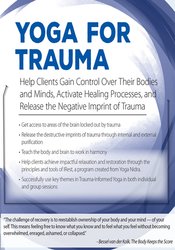

The impact of trauma is so profound that it is felt not just in the mind, but in the body as well. Survivors carry the effects of the traumatic events in their tissues, negatively affecting their ability to rest, to remember and process, and to achieve a state of regulation.
To successfully work with these clients, you need to utilize embodied practices that incorporate mind-body connection into your clinical practice. Mounting evidence points to yoga as a complementary tool that you need in your arsenal to effectively work with trauma survivors.
Michele Ribeiro has been using yoga and mindfulness with trauma survivors for over 20 years, and she wants to show you how to reenergize your own work. Find out how simple yoga poses and techniques can be introduced to help clients become aware of and then remove traumatic imprints through mind-body purifying processes. Teach clients how to send revitalizing, healing energy throughout their body. Discover the benefits of Yoga Nidra and how to help clients reach this state of relaxation and restoration.
This recording is your “how-to” guide for incorporating evidence-based yoga poses and techniques into your practice in a manner that is effective, ethical, and appropriate for your scope of practice.
You do not have to be a yoga therapist to apply what is learned in this recording to your own trauma work. You only need to have a desire to see transforming healing occur in the lives of your clients.
This online program is worth 6.25 hours CPD.
| File type | File name | Number of pages | |
|---|---|---|---|
| Manual - Yoga for Trauma (3.30 MB) | 79 Pages | Available after Purchase |
Michele D. Ribeiro, EdD, CGP, is a Licensed Psychologist, Certified Group Psychotherapist, Certified Yoga Instructor and a Children/Teens Meditation Course Teacher. She has been applying mindful awareness as a therapist and teaching mindfulness as a skill to clients presenting with depression, anxiety, ADHD, trauma, eating disorders and addiction issues for over 20 years.
Dr. Ribeiro began her yoga studies in 1997 and completed advanced yoga training in India at numerous yoga centers and ashrams including the Indian Yoga Institute, Prashanti Kuteeram in Bangalore, the Yoga Study Center in Rishikesh, the Ramamani Iyengar Memorial Yoga Institute in Pune, India and at the Iyengar Yoga Center of New York in NYC. She has written on mindfulness for the Group Psychologist Newsletter and assisted with editing journal articles on yoga and ALS in the Journal of Alternative and Complementary Medicine.
Dr. Ribeiro has a private consulting practice, works as a psychologist and instructor at Oregon State University and is co-owner of the Iyengar Yoga Center of the Willamette Valley in Corvallis, OR. She has taught yoga, mindfulness practices, and biofeedback at various universities, schools, and conferences throughout the United States and abroad while working as a psychologist for Semester at Sea.
She serves on the planning committee to create a new Yoga Certification Program, is on the steering committee for expanding Contemplative Studies and is co-leading the development of a new Mindful Living and Learning Community all at Oregon State University.
Speaker Disclosures:
Financial: Michele Ribeiro is in private practice. She receives a speaking honorarium from PESI, Inc. She has no relevant financial relationships with ineligible organizations.
Non-financial: Michele Ribeiro is a member of the American Group Psychotherapy Association.
The Promise of Yoga for Treating Trauma
Bring Traditional Yoga Components to Contemporary Trauma Treatment
Bring Practical Neuroscience Applications to Contemporary Trauma Treatment
Yoga as a Therapy Tool
Yoga Nidra (Changing States of Consciousness)
Trauma-Sensitive Yoga Scripts; Physical Movements and Forms
*Social workers: Please note that ACE credit is not available for yoga instruction/guided experience activities.
Satisfaction Guarantee
Your satisfaction is our goal and our guarantee. Concerns should be addressed to info@pesi.co.uk or call 01235847393.
Please wait ...